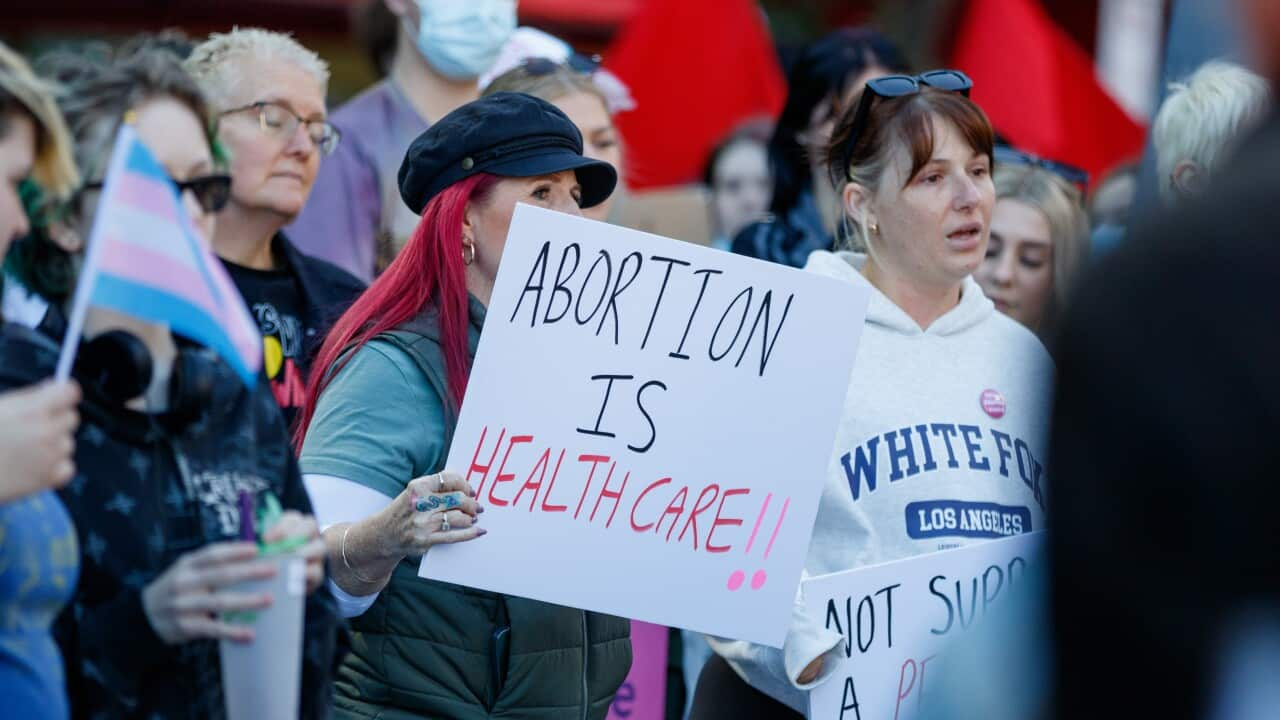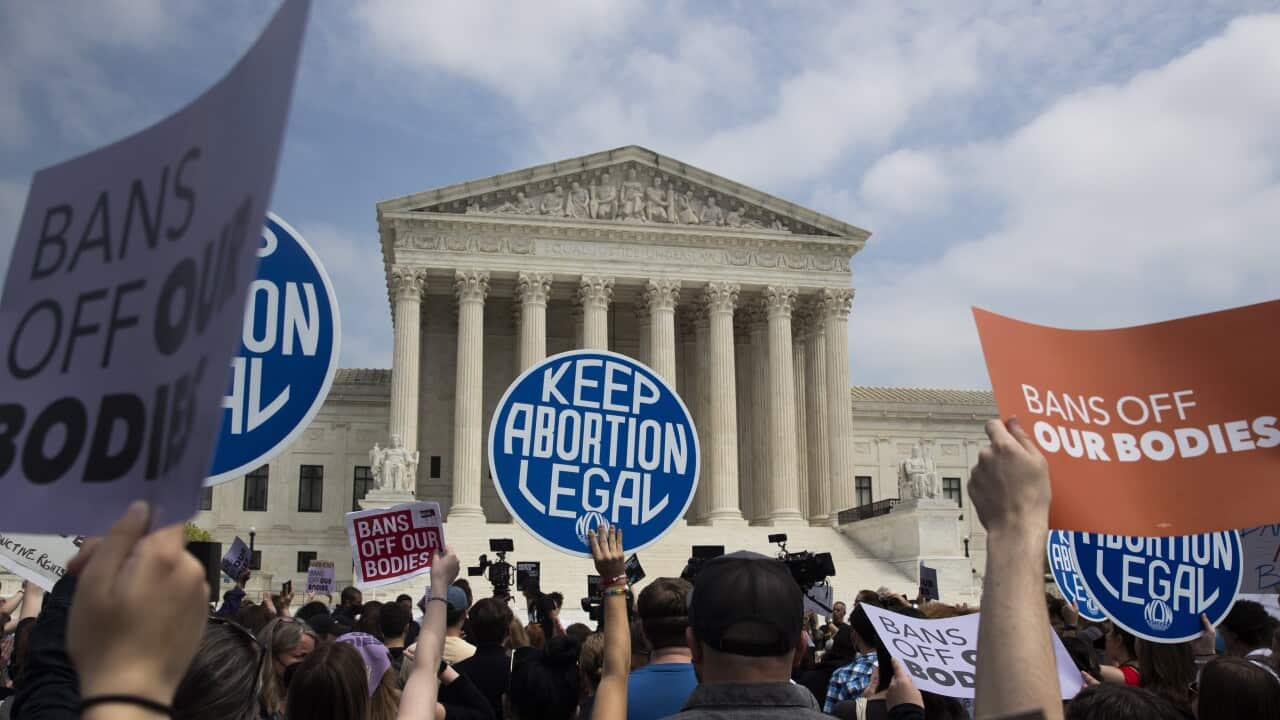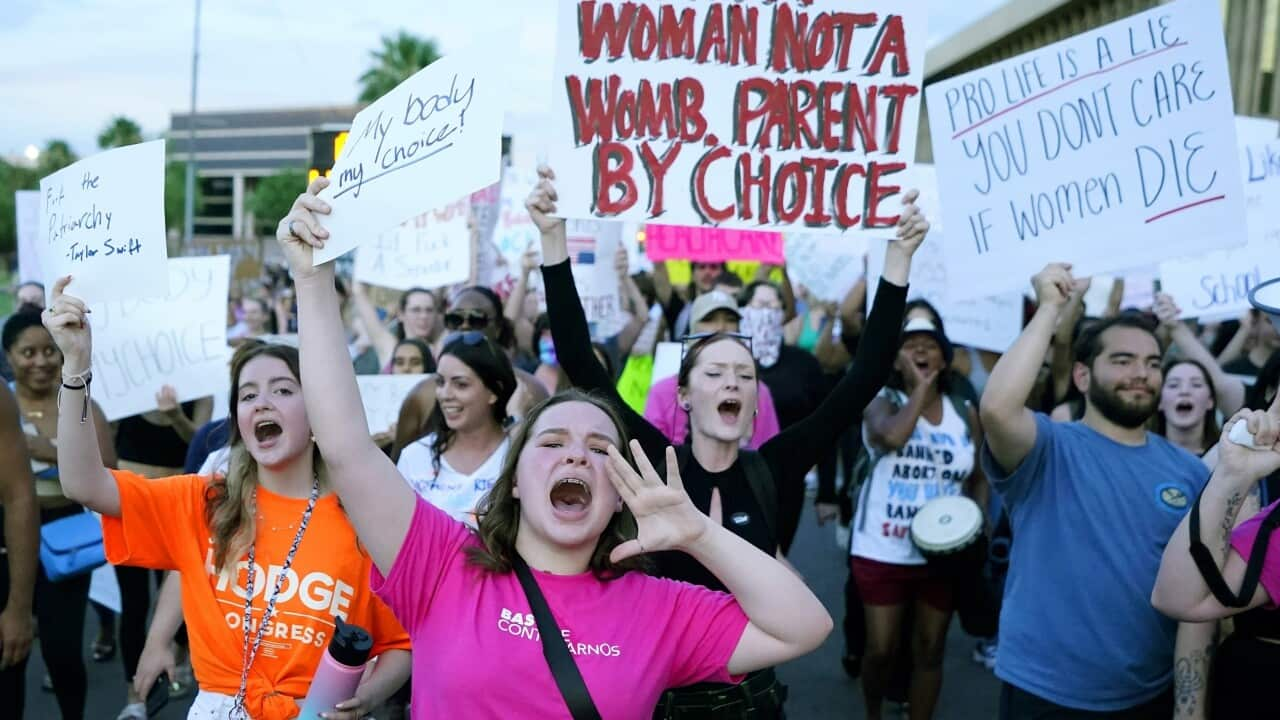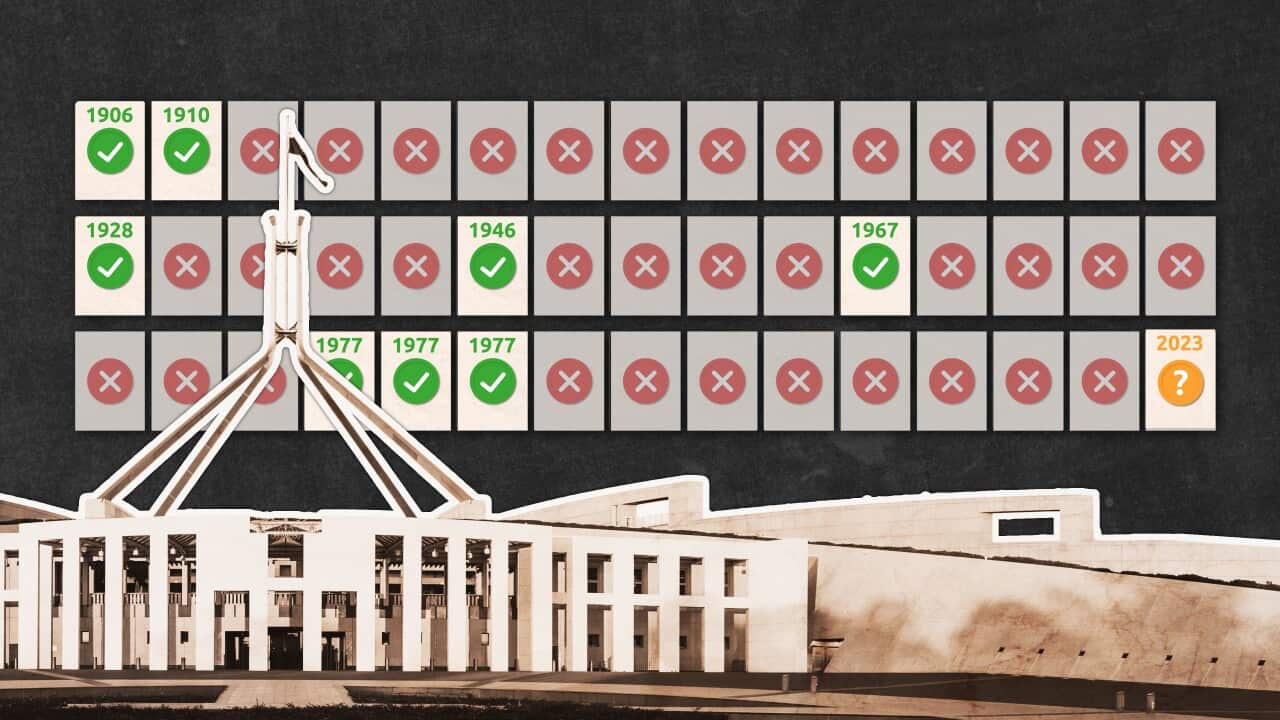

11 min read
Feature
Could abortion rights ever be reversed in Australia like in the US?
Two years ago, reproductive rights were wound back in the United States. Now, questions are being raised about whether something similar could happen in parts of Australia.
Published 24 October 2024 5:47am
Updated 24 October 2024 9:25am
By Jessica Bahr
Source: SBS News
Image: Australian activists have protested in solidarity with those seeking abortion in the US since the Supreme Court overturned the 1973 Roe v. Wade ruling, ending the constitutional right to abortion. (AAP / Sipa USA)
As the US election draws closer, abortion access and reproductive rights are again stoking conversation across the political spectrum.
Nearly half of all US states have introduced near-total or partial abortion bans in the last two years, and the outcome of the November poll could see more follow suit — depending on who wins.
Democratic candidate and current vice president while Republican candidate and former president Donald Trump is anti-abortion.
The recent changes to abortion access came into effect during Trump’s presidency. While in office, he appointed three to the Supreme Court, giving them a 6–3 majority.
In 2022, the Supreme Court overturned the landmark 1973 Roe v Wade case, ending nearly 50 years of constitutional abortion access and instead giving each state the right to regulate reproductive laws and restrictions.
After the decision, 13 states immediately introduced near-total bans and criminalised abortion. Eight others have bans with limits ranging from six to 18 weeks into pregnancy.
The winding back of these once-seemingly unassailable rights in the US has left many women around the world reeling, including in Australia.
The question many want to know is: Could the same thing happen here?
Queensland’s abortion access on the ballot
As Queensland’s state election approaches, the prospect of abortion rights being reduced has come into the spotlight.
Abortion was in 2018. Those who are up to 22 weeks pregnant may request a termination without disclosing the reason to a doctor.

Robbie Katter, the member for the electorate of Traeger, in north-west Queensland, has said he will introduce a bill to restrict abortion access in Queensland. Source: AAP / Darren England
But this could change after the 26 October election if the Liberal National Party (LNP) wins government from Labor.
Conservative MP Robbie Katter from the Katter Australia Party has confirmed he will re-introduce legislation in the next term of parliament that seeks to increase restrictions on abortion access.
Katter told the ABC earlier this month: "We will, quick as you like, put a repeal bill back into the Queensland parliament on those abortion laws."
State LNP leader David Crisafulli has previously said he has "no plans" to change abortion laws, which he reiterated during the final election debate on Tuesday night, but has not confirmed whether he would allow his LNP colleagues a conscience vote on the matter if elected.
At one media event, he was questioned on the subject 39 times and repeatedly deflected, saying abortion laws are "not a priority" for the LNP.
In 2018 Crisafulli and his deputy Jarrod Bleijie, along with all but three LNP MPs, voted against decriminalising abortion.
An LNP spokeswoman tells SBS News the party is not intending to change abortion laws.
"It’s not part of our plan, the LNP has ruled it out," she says.
In response to the increased discussions around abortion access, Premier Steven Miles has announced an expansion of pregnancy termination and reproductive care services.
Are abortions legal across Australia?
Abortion has been decriminalised across Australia, but each jurisdiction has different restrictions. In theory, it could be re-criminalised if anti-abortion state governments are elected.
There is no right to abortion enshrined in the Australian constitution and no overarching national law.
, with new laws coming into effect in 2024. Abortions are now legal up to 23 weeks of pregnancy.

Abortion has been decriminalised in all Australian jurisdictions. Source: AAP / Sipa USA
Similarly, in Victoria and the Northern Territory, abortion can be accessed up to a gestational limit of 24 weeks. Beyond that timeframe, abortion can be provided if two medical practitioners agree.
In NSW, an abortion can be performed up to 22 weeks gestation. After that, two doctors must approve and the abortion must take place in a hospital or approved medical facility.
The ACT allows abortions at any stage of gestation. Medical abortions are free for ACT residents up to nine weeks of pregnancy, while surgical abortions are free up to 16 weeks.
In Tasmania, abortions can be performed up to 16 weeks of pregnancy. They can also be performed between weeks 16 and 20 if two doctors agree, while after 20 weeks they can only performed if deemed medically necessary.
Unequal access to abortion in Australia
Louise Keogh, health sociologist at the University of Melbourne School of Population and Global Health, tells SBS News that while abortion has been decriminalised, this does not mean it is easy to access.
"In Australia, we have a heavy reliance on private services, which is not ideal," Keogh says.
"It’s very difficult to get cheap or free abortion in most states."
The cost of an abortion varies depending on the type of procedure, provider and location. In some cases, they can be free, but in others, they can cost thousands of dollars.
Many people also need to pay for additional medication, follow-up treatment and travel costs if they live in areas with limited services.
It’s very difficult to get cheap or free abortion in most states.Louise Keogh, health sociologist
Kirsten Black is a professor of sexual and reproductive health at the University of Sydney and says reproductive care remains difficult in many parts of the country.
She explains that women in small towns also face challenges when trying to find a doctor who will agree to perform or prescribe an abortion.
"If the GP in their town is a conscientious objector and won't provide medical abortion, they may need to do telehealth or they may need to travel large distances, and sometimes the pharmacists also will refuse to provide the pills that are prescribed," Black says.
"So I think that the other thing is that we need to look at our conscientious objection rules to ensure that healthcare practitioners who don't want to provide abortion, must refer to another practitioner so that the person has access."
Could abortion rights ever be reversed in Australia?
Queensland is not the only jurisdiction where the possibility of reversing or tightening abortion laws has been discussed.
In September, South Australian Liberal MP Ben Hood introduced a bill to force people who want to terminate their pregnancy after 28 weeks to deliver their baby alive. The mother would then have the choice to keep the child or have them adopted.
State parliament voted on the bill on 16 October and it was , with nine in favour and ten against.

Liberal upper house member Ben Hood proposed a bill that would require women seeking to terminate a pregnancy after 28 weeks to undergo an induced birth. Source: AAP / Matt Turner
Australia has never had federal protection for abortion, and regulations have always been state-based, in the same way the US now operates.
Dr Prudence Flowers, a senior lecturer in US History at Flinders University, says she believes total or near-total bans — similar to those being introduced in parts of the US — are unlikely in Australia.
"Because there has been such a recent wave of decriminalisation occurring over the last decade, it's very hard to imagine total bans being introduced," she says.
"I think in terms of the Australian context, the threat to abortion rights is more nuanced but still very real and it's something that people should pay a lot of attention to."
However, parts of Australia could face changes in regulations, higher costs and stricter gestation limits,says Flowers, adding that she is “almost certain” there will be a conscience vote in Queensland if the LNP is elected.
This is significant because in the decades before Roe v Wade was overturned, the anti-abortion movement in the US was focused on trying to ban or regulate abortions after 20 weeks of pregnancy, which Flowers says make up a "very rare and small number of abortions".
"They were really, really successful at achieving regulation and also stigmatising that procedure,” she says.
"In some ways, I think that's the space where the most immediate threat to abortion rights in Australia comes and you see that has happened in South Australia.
"I think attacks on abortion rights will start by focusing on later terminations … so trying to change the way in which abortion is regulated."
Has the federal government made any changes to abortion access?
From a federal perspective, changes to abortion laws in Australia would be complex.
One option would be through constitutional change, but this is a complex, lengthy and expensive process.
Changing the Australian constitution to enshrine protection – or restrictions – for abortion rights would require a bill to be created and passed through parliament, followed by a national referendum. To pass, it would need to be supported by 51 per cent of the population and four out of the six states.
Constitutional law scholar and associate professor at the University of Queensland, Rebecca Ananian-Welsh, says while this is theoretically possible, it is not likely.
"There's another option which happens and that's where the states give their power up or refer their power up to the Commonwealth government," she says.
"So the states will get together and say, we agree that the Commonwealth can legislate on this even though it doesn't usually do it."
But she said this is typically used for issues such as terrorism, which is not listed as a constitutional power, but was considered a national matter.
"Probably the most likely would be through what you might call cooperative federalism, which is where the states, territories and Commonwealth agree on some sort of cooperative approach," Ananian-Welsh says.
"It’s the easiest one legally speaking and constitutionally speaking … but politically speaking you are talking about getting different governments to agree with each other."
While neither the federal government nor the Opposition have indicated plans to change abortion access nationally, there are calls for existing protections and services to be improved.
Keogh says she believes the government could play a larger role in improving abortion services through public systems.
"I would really like to see public maternity hospitals in major cities playing the role that they should be playing in abortion provision," she says.
"I think there's potential for the federal government to put pressure on that and coordinate the states better in terms of providing the services that the community needs."
In a statement to SBS News, federal Health Minister Mark Butler said the government has removed several restrictions for providing and prescribing the medical abortion medication MS-2 Step, reducing barriers for both medical professionals and people seeking abortions.
"I am committed to ensuring that all Australian women have equitable access to the healthcare they need, particularly women in rural and regional areas and those experiencing disadvantage," he said.
"Surgical abortions remain a responsibility of the states, as they manage public hospitals."
-Additional reporting by Australian Associated Press
Want more politics? You can stream poignant political documentaries from the SBS On Demand 'Politics and Power' collection and keep up with daily news bulletins in the .






